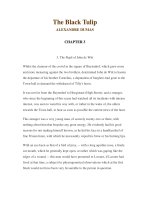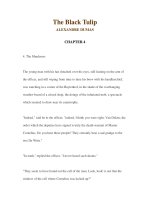LUYỆN ĐỌC TIẾNG ANH QUA CÁC TÁC PHẨM VĂN HỌC –The Black Tulip ALEXANDRE DUMAS CHAPTER 25 pptx
Bạn đang xem bản rút gọn của tài liệu. Xem và tải ngay bản đầy đủ của tài liệu tại đây (25.08 KB, 12 trang )
The Black Tulip
ALEXANDRE DUMAS
CHAPTER 25
25. The President van Systens
Rosa, on leaving Cornelius, had fixed on her plan, which was no other than to
restore to Cornelius the stolen tulip, or never to see him again.
She had seen the despair of the prisoner, and she knew that it was derived from
a double source, and that it was incurable.
On the one hand, separation became inevitable, Gryphus having at the same
time surprised the secret of their love and of their secret meetings.
On the other hand, all the hopes on the fulfilment of which Cornelius van Baerle
had rested his ambition for the last seven years were now crushed.
Rosa was one of those women who are dejected by trifles, but who in great
emergencies are supplied by the misfortune itself with the energy for combating
or with the resources for remedying it.
She went to her room, and cast a last glance about her to see whether she had
not been mistaken, and whether the tulip was not stowed away in some corner
where it had escaped her notice. But she sought in vain, the tulip was still
missing; the tulip was indeed stolen.
Rosa made up a little parcel of things indispensable for a journey; took her three
hundred guilders, that is to say, all her fortune, fetched the third bulb from
among her lace, where she had laid it up, and carefully hid it in her bosom; after
which she locked her door twice to disguise her flight as long as possible, and,
leaving the prison by the same door which an hour before had let out Boxtel,
she went to a stable-keeper to hire a carriage.
The man had only a two-wheel chaise, and this was the vehicle which Boxtel
had hired since last evening, and in which he was now driving along the road to
Delft; for the road from Loewestein to Haarlem, owing to the many canals,
rivers, and rivulets intersecting the country, is exceedingly circuitous.
Not being able to procure a vehicle, Rosa was obliged to take a horse, with
which the stable-keeper readily intrusted her, knowing her to be the daughter of
the jailer of the fortress.
Rosa hoped to overtake her messenger, a kind-hearted and honest lad, whom
she would take with her, and who might at the same time serve her as a guide
and a protector.
And in fact she had not proceeded more than a league before she saw him
hastening along one of the side paths of a very pretty road by the river. Setting
her horse off at a canter, she soon came up with him.
The honest lad was not aware of the important character of his message;
nevertheless, he used as much speed as if he had known it; and in less than an
hour he had already gone a league and a half.
Rosa took from him the note, which had now become useless, and explained to
him what she wanted him to do for her. The boatman placed himself entirely at
her disposal, promising to keep pace with the horse if Rosa would allow him to
take hold of either the croup or the bridle of her horse. The two travellers had
been on their way for five hours, and made more than eight leagues, and yet
Gryphus had not the least suspicion of his daughter having left the fortress.
The jailer, who was of a very spiteful and cruel disposition, chuckled within
himself at the idea of having struck such terror into his daughter's heart.
But whilst he was congratulating himself on having such a nice story to tell to
his boon companion, Jacob, that worthy was on his road to Delft; and, thanks to
the swiftness of the horse, had already the start of Rosa and her companion by
four leagues.
And whilst the affectionate father was rejoicing at the thought of his daughter
weeping in her room, Rosa was making the best of her way towards Haarlem.
Thus the prisoner alone was where Gryphus thought him to be.
Rosa was so little with her father since she took care of the tulip, that at his
dinner hour, that is to say, at twelve o'clock, he was reminded for the first time
by his appetite that his daughter was fretting rather too long.
He sent one of the under-turnkeys to call her; and, when the man came back to
tell him that he had called and sought her in vain, he resolved to go and call her
himself.
He first went to her room, but, loud as he knocked, Rosa answered not.
The locksmith of the fortress was sent for; he opened the door, but Gryphus no
more found Rosa than she had found the tulip.
At that very moment she entered Rotterdam.
Gryphus therefore had just as little chance of finding her in the kitchen as in her
room, and just as little in the garden as in the kitchen.
The reader may imagine the anger of the jailer when, after having made
inquiries about the neighbourhood, he heard that his daughter had hired a horse,
and, like an adventuress, set out on a journey without saying where she was
going.
Gryphus again went up in his fury to Van Baerle, abused him, threatened him,
knocked all the miserable furniture of his cell about, and promised him all sorts
of misery, even starvation and flogging.
Cornelius, without even hearing what his jailer said, allowed himself to be ill-
treated, abused, and threatened, remaining all the while sullen, immovable, dead
to every emotion and fear.
After having sought for Rosa in every direction, Gryphus looked out for Jacob,
and, as he could not find him either, he began to suspect from that moment that
Jacob had run away with her.
The damsel, meanwhile, after having stopped for two hours at Rotterdam, had
started again on her journey. On that evening she slept at Delft, and on the
following morning she reached Haarlem, four hours after Boxtel had arrived
there.
Rosa, first of all, caused herself to be led before Mynheer van Systens, the
President of the Horticultural Society of Haarlem.
She found that worthy gentleman in a situation which, to do justice to our story,
we must not pass over in our description.
The President was drawing up a report to the committee of the society.
This report was written on large-sized paper, in the finest handwriting of the
President.
Rosa was announced simply as Rosa Gryphus; but as her name, well as it might
sound, was unknown to the President, she was refused admittance.
Rosa, however, was by no means abashed, having vowed in her heart, in
pursuing her cause, not to allow herself to be put down either by refusal, or
abuse, or even brutality.
"Announce to the President," she said to the servant, "that I want to speak to
him about the black tulip."
These words seemed to be an "Open Sesame," for she soon found herself in the
office of the President, Van Systens, who gallantly rose from his chair to meet
her.
He was a spare little man, resembling the stem of a flower, his head forming its
chalice, and his two limp arms representing the double leaf of the tulip; the
resemblance was rendered complete by his waddling gait which made him even
more like that flower when it bends under a breeze.
"Well, miss," he said, "you are coming, I am told, about the affair of the black
tulip."
To the President of the Horticultural Society the Tulipa nigra was a first-rate
power, which, in its character as queen of the tulips, might send ambassadors.
"Yes, sir," answered Rosa; "I come at least to speak of it."
"Is it doing well, then?" asked Van Systens, with a smile of tender veneration.
"Alas! sir, I don't know," said Rosa.
"How is that? could any misfortune have happened to it?"
"A very great one, sir; yet not to it, but to me."
"What?"
"It has been stolen from me."
"Stolen! the black tulip?"
"Yes, sir."
"Do you know the thief?"
"I have my suspicions, but I must not yet accuse any one."
"But the matter may very easily be ascertained."
"How is that?"
"As it has been stolen from you, the thief cannot be far off."
"Why not?"
"Because I have seen the black tulip only two hours ago."
"You have seen the black tulip!" cried Rosa, rushing up to Mynheer van
Systens.
"As I see you, miss."
"But where?"
"Well, with your master, of course."
"With my master?"
"Yes, are you not in the service of Master Isaac Boxtel?"
"I?"
"Yes, you."
"But for whom do you take me, sir?"
"And for whom do you take me?"
"I hope, sir, I take you for what you are, that is to say, for the honorable
Mynheer van Systens, Burgomaster of Haarlem, and President of the
Horticultural Society."
"And what is it you told me just now?"
"I told you, sir, that my tulip has been stolen."
"Then your tulip is that of Mynheer Boxtel. Well, my child, you express
yourself very badly. The tulip has been stolen, not from you, but from Mynheer
Boxtel."
"I repeat to you, sir, that I do not know who this Mynheer Boxtel is, and that I
have now heard his name pronounced for the first time."
"You do not know who Mynheer Boxtel is, and you also had a black tulip?"
"But is there any other besides mine?" asked Rosa, trembling.
"Yes, that of Mynheer Boxtel."
"How is it?"
"Black, of course."
"Without speck?"
"Without a single speck, or even point."
"And you have this tulip, you have it deposited here?"
"No, but it will be, as it has to be exhibited before the committee previous to the
prize being awarded."
"Oh, sir!" cried Rosa, "this Boxtel this Isaac Boxtel who calls himself the
owner of the black tulip "
"And who is its owner?"
"Is he not a very thin man?"
"Bald?"
"Yes."
"With sunken eyes?"
"I think he has."
"Restless, stooping, and bowlegged?"
"In truth, you draw Master Boxtel's portrait feature by feature."
"And the tulip, sir? Is it not in a pot of white and blue earthenware, with
yellowish flowers in a basket on three sides?"
"Oh, as to that I am not quite sure; I looked more at the flower than at the pot."
"Oh, sir! that's my tulip, which has been stolen from me. I came here to reclaim
it before you and from you."
"Oh! oh!" said Van Systens, looking at Rosa. "What! you are here to claim the
tulip of Master Boxtel? Well, I must say, you are cool enough."
"Honoured sir," a little put out by this apostrophe, "I do not say that I am
coming to claim the tulip of Master Boxtel, but to reclaim my own."
"Yours?"
"Yes, the one which I have myself planted and nursed."
"Well, then, go and find out Master Boxtel, at the White Swan Inn, and you can
then settle matters with him; as for me, considering that the cause seems to me
as difficult to judge as that which was brought before King Solomon, and that I
do not pretend to be as wise as he was, I shall content myself with making my
report, establishing the existence of the black tulip, and ordering the hundred
thousand guilders to be paid to its grower. Good-bye, my child."
"Oh, sir, sir!" said Rosa, imploringly.
"Only, my child," continued Van Systens, "as you are young and pretty, and as
there may be still some good in you, I'll give you some good advice. Be prudent
in this matter, for we have a court of justice and a prison here at Haarlem, and,
moreover, we are exceedingly ticklish as far as the honour of our tulips is
concerned. Go, my child, go, remember, Master Isaac Boxtel at the White Swan
Inn."
And Mynheer van Systens, taking up his fine pen, resumed his report, which
had been interrupted by Rosa's visit.









